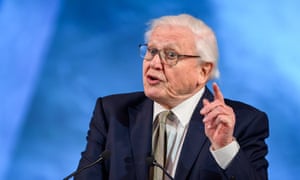Human activity has created a new era yet climate change can be stopped, says naturalist
Sir David Attenborough
has warned that “the Garden of Eden is no more”, as he urged political
and business leaders from around the world to make a renewed push to
tackle climate change before the damage is irreparable.
Speaking at the start of the World Economic Forum (WEF) in Davos, Switzerland, the 92-year-old naturalist and broadcaster warned that human activity has taken the world into a new era, threatening to undermine civilisation.
“I am quite literally from another age,” Attenborough told an audience of business leaders, politicians and other delegates. “I was born during the Holocene – the 12,000 [year] period of climatic stability that allowed humans to settle, farm, and create civilisations.” That led to trade in ideas and goods, and made us the “globally connected species we are today”.
“The Holocene has ended. The Garden of Eden is no more. We have changed the world so much that scientists say we are in a new geological age: the Anthropocene, the age of humans,” he declared.
In a stark warning to the world leaders and business chiefs flocking
to the WEF this week, Attenborough warned that the only conditions that
humans have known are changing fast.
“We need to move beyond guilt or blame, and get on with the practical tasks at hand.”
A survey conducted before the WEF found that environmental threats are now the biggest danger to the global economy, and concern is mounting that co-operation between countries on the issue is breaking down.
Attenborough admitted that even he has been surprised by the speed of
the damage caused to the environment during his career making TV
programmes showing life on earth.Speaking at the start of the World Economic Forum (WEF) in Davos, Switzerland, the 92-year-old naturalist and broadcaster warned that human activity has taken the world into a new era, threatening to undermine civilisation.
“I am quite literally from another age,” Attenborough told an audience of business leaders, politicians and other delegates. “I was born during the Holocene – the 12,000 [year] period of climatic stability that allowed humans to settle, farm, and create civilisations.” That led to trade in ideas and goods, and made us the “globally connected species we are today”.
“The Holocene has ended. The Garden of Eden is no more. We have changed the world so much that scientists say we are in a new geological age: the Anthropocene, the age of humans,” he declared.
“We need to move beyond guilt or blame, and get on with the practical tasks at hand.”
A survey conducted before the WEF found that environmental threats are now the biggest danger to the global economy, and concern is mounting that co-operation between countries on the issue is breaking down.
In response, Attenborough – recently voted Britain’s most trustworthy celebrity – said humans must use their expert problem-solving skills. “If people can truly understand what is at stake, I believe they will give permission for business and governments to get on with the practical solutions,” he told the WEF.
Get it right, he argued, and humans can create a world with clean air and water, unlimited energy and sustainable fish stocks, but only if decisive action is taken now.
“Over the next two years there will be United Nations decisions on climate change, sustainable development and a new deal for nature. Together these will form our species’ plan for a route through the Anthropocene.
“What we do now, and in the next few years, will profoundly affect the next few thousand years,” he added.
Speaking to journalists after his speech, Attenborough warned that economic models needed to change. “Growth is going to come to an end, either suddenly or in a controlled way,” he explained, citing the old joke that anyone who thinks you can have infinite growth in finite circumstances is “either a madman or an economist.”.
He is also hopeful that he can change hearts and minds during his trip to Davos, pointing out that some delegates have more power than a nation state. “The enormity of the problem has only just dawned on quite a lot of people ... Unless we sort ourselves out in the next decade or so we are dooming our children and our grandchildren to an appalling future.”
Before he spoke, Attenborough received the Crystal award from the WEF for his work. Saudi Arabia’s first female film-maker, Haifaa al-Mansour, and conductor Marin Alsop of the Baltimore Symphony were also honoured for their work.
Prince William is due to appear with Attenborough to discuss environmental issues at the WEF on Tuesday.

No comments:
Post a Comment